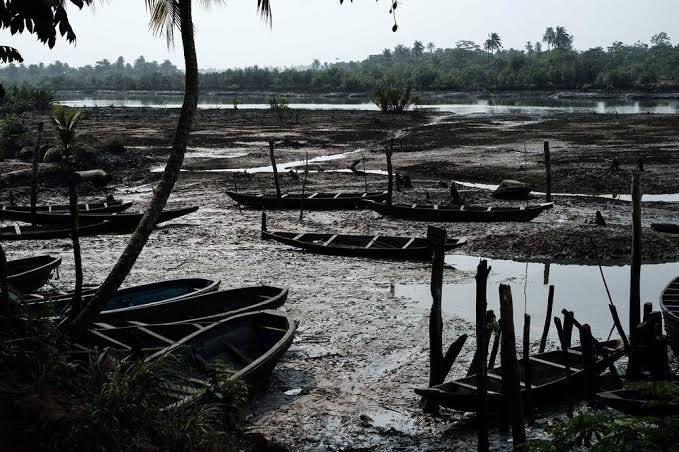Complicated Cases, Spills, Sludges: Time to call Oil Giants to Order
What should be the right action against fossil fuel companies with their refusal to pay compensations after devastating oil spills?
Gbaramatu Oil Spill, Credit, Plus TV Africa
Thirteen years ago, four million barrels of crude oil seeped into the Gulf of Mexico, killed about eleven people in BP’s Deepwater Horizon oil spill, with thirty-three thousand people and tens of thousands of workers drafted to clean up the sludge on beaches, mangrove, and sand dunes across the Florida Panhandle, Mississippi, Louisiana, and Texas.
Over the years, lots of barrels of crude oil flowed into the oil rich Gbaramatu Kingdom in Warri South Local Government Area of Delta State, Nigeria, killing many people, in Nigeria National Petroleum Company (NNPC) and Chevron oil spills, with numerous sympathizers drafted to contain the spills in communities such as Okerenkoko, Ikpokpo, Opuedebubor, Azama, Oporoza, and others.
Between 1964 and 1992, 17 million barrels of crude oil flowed into the Ecuadorian Amazon, destroying the surroundings of villagers in the Lago Agrio region, in Chevron/Texaco oil spills, with lots of workers drafted to clean up the area.
Protracted litigations usually occurred during these incidents, as the inhabitants around the Gulf of Mexico, together with the people of Gbaramatu and Lago Agrio, took the international oil companies to court for the crude oil that seeped into their communities, leading to oil giants’ partial reward, but few, if any, full environmental and health damages paid, with outcomes taking decades of litigations.
BP and its partners Transocean and Halliburton refused to pay fully for environmental and other damages in the Gulf of Mexico, claiming that thousands of fishermen, sea food processors, restaurant owners, and others did not have the right to sue over the spills, and then engaging in other delay tactics to frustrate the payments of full costs connected to their activities.
Chevron refused to fully pay the environmental and other challenges caused to the communities in the Niger Delta in Nigeria, because it claims that its facilities did not cause oil spills, sometimes blaming sabotage for the occurrences resulting from its installations.
Chevron refused to pay plaintiffs $8.6 billion damages from the oil contamination in the Amazon jungle of Ecuador after 18 years in court, engaging international arbiters at Hague, Netherlands and a U.S. district court in New York to complicate the case, then separately blocking the enforcement of the verdict in Ecuador, and then appealing the court judgment, knowing the appeal period could drag on for years, during which time no payments could be made.
In other words, international oil companies such as Chevron, B.P., Exxon Mobil, and others refuse to pay for environmental and health damages caused by their oil production activities, blaming sabotage on the part of communities located near their facilities, frustrating judgments through endless appeals against people’s legitimate rights, not taking responsibility for the destruction they caused.
In the aftermath of the Gulf of Mexico tragedy, researchers discovered that workers during the clean-up operations became 60 percent more likely than the general population to be diagnosed for asthma or experienced respiratory symptoms, with countless other victims developing various types of cancers, after the oil companies hired them to save the environment.
In the Gbaramatu Kingdom, the researchers discovered that babies became twice as likely to die in the first month of life if their mothers lived near an oil spill before falling pregnant, while another study found that through oil spills waterways become covered with black liquid, animals not able to breathe, trees and plants dying along the coast, with the situation affecting humans.
In Ecuador, researchers discovered that months after an oil spill in the Amazon, pollution affected the water of the Kichwas, with trees at the river banks turning black, the health of many impaired, and 360 kilometers of rivers contaminated with hydrocarbon compounds, causing cancers and other dangerous ailments.
Since oil companies refused to properly clean-up the environment after oil spills in the Gulf of Mexico, the Nigerian Niger Delta, and the Ecuadorian Amazon forests, researchers endlessly discover indigenous people developing various types of cancers, impairing the health of women and children, as well as contaminating an environment with hydrocarbon compounds, which severely affect the health of plants and animal.
Perhaps chief executives of oil companies should physically visit production areas in places like Gbaramatu for on-the-spot assessments of their activities, as this could force honesty and transparency in relation to oil spill victims, while developing countries should be encouraged to improve their own legal systems so they can provide justice in the event of oil spills.
Citizens of oil producing nations and others should intellectually encourage governments to stop spending lots of time sponsoring an unworkable solution, pursuing the pointless policy of concentrating only on consumption and not focusing on limiting oil production, which should be the focus of campaigns in order to stop victims from languishing in pains decades after oil spills.
When affected people intellectually encounter oil companies over activities such as oil spills, and governments are intellectually encouraged to place their focus on limiting oil production, the population of oil spill victims in the United States, Ecuador, Nigeria, and other countries will certainly show a drastic decline.
What to Eat
Ecuador vegan diet, Credit, Lily Ann Fouts
.





